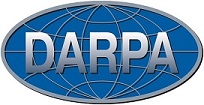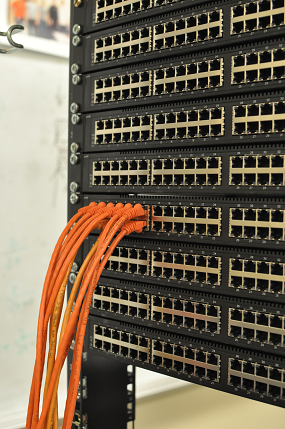OCEAN
The Ocean Cluster for Experimental Architectures in Networks (OCEAN) enables networked systems research from low-level physical wiring to network protocols and applications, via a software defined networking (SDN)-capable network testbed.
OCEAN is currently composed of 176 server ports and 676 switch ports, using Pica8 Pronto 3290 switches via TAM Networks, NIAGARA 32066 NICs from Interface Masters, and servers from Dell.
Research
OCEAN is supporting research in software-defined networks, security, cloud computing, low-latency networking, and more. Projects include:
- VeriFlow: The complexity of modern networks leads to frequent outages and vulnerabilities in critical infrastructure. VeriFlow is a system which helps network operators understand what their network is actually doing. VeriFlow verifies network-wide correctness and security properties, operating in real time with millisecond-level latency as each forwarding rule is modified by the network controller. VeriFlow received a Best Paper Award at HotSDN 2012. For more, see:
Ahmed Khurshid, Xuan Zou, Wenxuan Zhou, Matthew Caesar, and P. Brighten Godfrey. VeriFlow: Verifying Network-Wide Invariants in Real Time. 10th USENIX Symposium on Networked Systems Design and Implementation (NSDI), April 2013.
- Jellyfish: Big data analytics and cloud computing are placing increasingly formidable demands on data center networks to achieve high bandwidth at enormous scale. Current designs are expensive and complex because they require rigid network structure, interfering with incremental expansion and use of heterogeneous components. Jellyfish is an unorthodox data center network architecture based on a random interconnect among switches, which yields flexible incremental expansion, and 25-40% higher bandwidth than state-of-the-art fat-tree designs using the same equipment. (Jellyfish is separately generously funded by Cisco Systems, Inc.) For more, see:
Ankit Singla, Chi-Yao Hong, Lucian Popa, and P. Brighten Godfrey. Jellyfish: Networking Data Centers Randomly. 9th USENIX Symposium on Networked Systems Design and Implementation (NSDI), April 2012.
- LIME is a system that consistently migrates virtual networks. LIME clones the data plane state to the new location, then incrementally migrates traffic sources, in a manner that is both consistent (transparent to applications running at endpoints and the network controller) and efficient (fast and low overhead).
Soudeh Ghorbani, Cole Schlesinger, Matthew Monaco, Eric Keller, Matthew Caesar, Jennifer Rexford, and David Walker. Transparent, Live Migration of a Software-Defined Network. 5th ACM Symposium on Cloud Computing (SOCC), November 2014.
Team
OCEAN is built and operated by the research groups of Prof. Matthew Caesar and Prof. Brighten Godfrey. Major development of the testbed infrastructure was carried out by Kyle Jao, Devasia Manuel, Mo Dong, and Chi-Yao Hong. Web design by Xuan Zou.
Acknowledgements
We gratefully acknowledge major funding from the National Science Foundation and DARPA, as well as contributions from Interface Masters, TAM Networks, and Pica8.
 |
 |
 |
 |
 |


